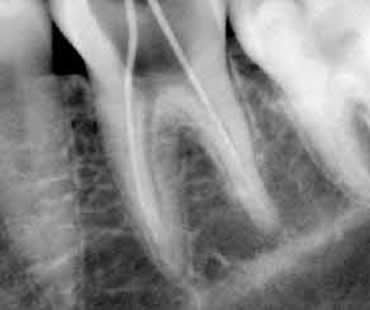
If you are dealing with ongoing tooth pain, you may be too fearful to go to the dentist to find out what’s going on. It’s important that you do, however, as you may need root canal therapy. Your dentist will need to evaluate you to see if that procedure is necessary, and will closely examine several factors: the signs the dentist can see personally, the results of any tests performed during your visit, and the symptoms you have been experiencing with the problematic tooth.
Your dentist may observe:
- A tooth that is discolored
- X-rays that reveal a tooth problem
- A fistulous tract, or persistent or recurring gum pimple
Additional testing done by your dentist:
- X-rays provide an extremely clear picture of the health of the tooth
- Thermal testing can evaluate sensitivity through a careful application of hot or cold temperatures
- Percussion testing evaluates pain response through gentle tapping
You may have been noticing:
- A broken or cracked tooth obviously decayed or damaged
- A discolored tooth, especially a grey tooth
- A “bubble” in your gums, like a pimple. It may or may not have ruptured, leaking pus that smells or tastes awful
- Pain that shoots out from one tooth to your jaw or ear, leading to earache symptoms
- Pain that prevents you from living your life without painkillers
- Pain, sensitivity or swelling on one certain tooth
- Extreme sensitivity to hot or cold liquids that lingers and is very painful
In some cases, an infected tooth that requires a root canal treatment has no symptoms at all that could be discerned by you. Only a dental professional can confirm the need to undergo root canal therapies. If you are experiencing pain that disrupts your life, talk to your dentist or endodontist immediately. Root canal treatments are designed to relieve the pain you’re experiencing now and to restore your tooth to full form and function. Don’t wait to get your life and smile back!
If you need a dentist in Meriden contact us today

If you have tooth pain or another issue, you might wonder what a visit to the dentist may reveal. You may need a root canal procedure. In order to properly evaluate your issue and to confirm the need for a procedure, a dentist will examine several factors. These typically include the symptoms you are experiencing, the signs observed, and any additional testing required to confirm an initial theory.
You may have noticed:
- You experience average to severe pain that lingers, during or immediately after drinking hot liquids or food, or very cold liquids or foods.
- You have pain, swelling, or sensitivity when biting or chewing on a certain tooth.
- Your tooth pain disrupts your life, preventing you from sleeping through the night or conducting your daily business without taking an over-the-counter pain reliever.
- You have a “bubble” on your gum, similar to a pimple. When irritated, it may release blood or pus that can smell or taste bad.
- You have pain that radiates out from one tooth to other areas of your head or jaw. For example, a tooth pain can lead to a pain behind the eye like a headache or to the ear, resulting in earache symptoms.
- You have a discolored tooth that is darker than the surrounding teeth. A grey tooth can indicate a “dead” tooth.
- You have a broken or cracked tooth with obvious signs of damage or decay.
Your dentist may have noticed:
- A tooth problem revealed by x-rays
- A recurring or persistent gum pimple (also called “fistulous tracts”)
- A tooth that has changed color
Additional testing:
- X-ray examination – if x-rays did not reveal the problem, they can provide an extremely clear picture of tooth health
- Percussion testing – a gentle tapping on the teeth to evaluate pain response
- Thermal testing – a careful application of a hot or cold stimulus to evaluate sensitivity
Sometimes, teeth needing to undergo a root canal procedure have no symptoms discernible to the patient. It is important to visit your dentist regularly to ensure the proper diagnosis and treatment needed to maintain life-long oral health.
If you need root canal treatment in the Meriden area, contact our office today to schedule a consultation.

Most people would rather do anything than have a root canal. Unfortunately, this procedure receives a bad rap. A root canal is generally performed to clean out an infected tooth and prevent future problems. Usually, patients feel better after root canal therapy.
Knowing the truth about root canals may help you feel less apprehensive if your dentist recommends this procedure.
- A root canal hurts.
Actually, the pain you feel is caused by the swelling and pressure in your tooth. When a tooth sustains severe trauma, the pulp, or soft nerve center, may die. During a root canal, your dentist will remove the damaged tissue, disinfect the tooth, and seal off the inside. Most people only experience mild soreness afterwards, if they feel any discomfort at all.
- Root canal therapy takes many appointments.
Although this timing depends on the severity of the case, most root canals are completed in one to two appointments. Once your dentist finishes the root canal, you will probably need at least one more visit for restoration of the tooth, usually with an inlay, onlay, or crown.
- I only need a root canal if my tooth hurts.
Pain often lets you know you have a problem with a tooth, but if your tooth root dies you may have no symptoms. The dentist can perform tests to determine the health of a tooth, including temperature and percussion testing.
- The root canal won’t last.
Once the tooth is cleaned and sealed, you should have no further problems with the tooth. Sometimes the restoration of the tooth fails, which can causes the tooth to crack or break. This usually occurs if you wait too long to have a crown or adequate filling placed.
Schedule your appointment at our Meriden dental office

Pain, sensitivity, and trouble eating or sleeping are only a few of the uncomfortable symptoms of a damaged tooth. Sometimes the inside portion of a tooth, or its pulp, becomes so damaged that action must be taken. It could come in the form of extracting the tooth or it might be able to be saved through root canal treatment.
Virtually every dentist recommends root canal therapy over tooth extraction. It’s almost always better to save your natural tooth. Otherwise, you’ll end up with a hole in your smile and the problems that accompany it.
A tooth can be damaged for a variety of reasons such as severe decay, trauma, or deep cavities. The damaged pulp contains nerves, which is one reason that many patients experience severe pain. Although dental fillings can remedy some cavities or decay, when the situation advances to the extent of harming the tooth pulp, fillings are not enough. Root canal treatment is usually the best way to repair the tooth without having to pull it.
A root canal procedure involves drilling into the tooth so that the pulp can be completely removed and the canal thoroughly cleaned. Then the area is filled with special material and sealed to prevent future damage. Often, a dental crown is placed on top of the restored tooth to provide added protection. This process alleviates any symptoms and give you back your fully functional, natural tooth.
If you were to opt for tooth extraction instead of root canal treatment, you’d be choosing a more invasive approach. The procedure can be intrusive, time consuming and costly. Recovery from tooth extraction can be uncomfortable and take longer than root canal therapy. Careful oral hygiene is necessary after extraction to avoid infection or complications. You’ll also be left with an unappealing hole in your smile that can make eating and speaking more difficult, and your other teeth will likely start moving into that empty space.
To determine the best treatment for you, consult a reputable dentist. You’ll learn about the options and how root canal therapy may be the best choice in restoring your oral health and your smile.
We look forward to seeing you in our Meriden dental office

Having tooth pain or problems can be one of the most uncomfortable experiences possible. It is hard to ignore because it makes your whole quality of life worse. When infection or decay reaches the inner parts of your tooth, it can cause many miserable symptoms. Often the key is getting root canal treatment to save your tooth and alleviate your symptoms. Here are some warning signs that indicate you might need this type of treatment.
Severe pain:
Although not always present, severe pain sometimes occurs with a tooth that needs root canal therapy. It may be sharp, intense pain or a dull ache that won’t subside. If you experience tooth pain that is severe or lasts for several days, see your dentist for an evaluation. If root canal treatment is necessary, any pain you may have will likely disappear after a successful procedure.
Sensitivity to hot or cold:
Discomfort when consuming hot or cold items is another sign of a problem. Mild sensitivity is usually not a big deal, but actual pain when your tooth hits these temperatures may mean the tooth is in an advanced stage of trouble.
Gum tenderness or inflammation:
Swelling or tenderness is often associated with infection, although it doesn’t always mean infection is present. Your dentist can determine the seriousness of the issues and whether root canal treatment is advised. Watch for tenderness, swelling, or even a lump in the affected area.
Darkened tooth:
Discoloration is a sign that the nerves of a tooth are damaged. The tooth may become gray, black or dark yellow. Tooth discoloration is also related to trauma, damaged fillings or severe decay, so visiting your dentist for a checkup is recommended.
Gum boils:
If lesions similar to a pimple form in the gum tissues, it is called a gum boil. It is usually an accumulation of pus, which can be linked to infection. The boil may be larger or smaller at certain times, depending on the activity of the infection in your mouth. It will feel tender and can cause swelling in the area, and you may notice a bad taste in your mouth.
If you have symptoms such as these, see your dentist to learn if root canal treatment is the solution.
We treat patients from Meriden and the surrounding area

If root canal treatment has been recommended for you, you’re probably a little nervous. Maybe you’re a LOT nervous, but if you’re thinking about putting off your treatment, don’t. If you need root canal therapy, the underlying conditions that necessitate it will not go away left untreated. In fact, they’ll just get worse and worse over time, causing you more pain and discomfort and potentially leading to more serious complications.
If you don’t treat the infection in your tooth, it will spread. Beginning at your tooth’s roots, it will travel to your jawbone and eventually to your healthy teeth. Your entire jawbone can be put at risk. By treating your infection promptly with root canal therapy, your mouth can be free of infection and you will begin the process of healing.
Serious diseases like heart disease and diabetes have been directly linked to gum disease. During pregnancy, many problems including low birth weight and premature birth can occur as a direct result of infection and bacteria in the mouth. Several types of cancers have all been shown to have a link to poor overall oral health. The mouth is truly the pathway for everything that goes into the body, and if it’s providing a steady stream of bacteria and infection to be spread throughout your body, it’s extremely problematic.
Don’t worry about pain following your procedure. Root canal therapies are meant to relieve pain, not cause it. You’ll be surprised how much better you’ll feel after your mouth is infection-free.
If you ignore your infected tooth for long enough, it may either fall out on its own or need to be extracted. Missing teeth come with a long list of oral issues, including difficulties with bite alignment and speech only corrected with some kind of dental restoration.
Don’t wait to have your root canal treatment. Don’t open yourself up to the myriad of consequences that could result from postponing treatment.
Schedule your appointment at our Meriden dental office














